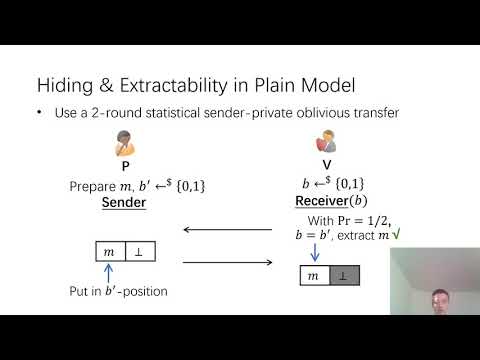CryptoDB
Statistical Zaps and New Oblivious Transfer Protocols
| Authors: |
|
|---|---|
| Download: |
|
| Presentation: | Slides |
| Conference: | EUROCRYPT 2020 |
| Abstract: | We study the problem of achieving statistical privacy in interactive proof systems and oblivious transfer -- two of the most well studied two-party protocols -- when limited rounds of interaction are available. -- Statistical Zaps: We give the first construction of statistical Zaps, namely, two-round statistical witness-indistinguishable (WI) protocols with a public-coin verifier. Our construction achieves computational soundness based on the quasi-polynomial hardness of learning with errors assumption. -- Three-Round Statistical Receiver-Private Oblivious Transfer: We give the first construction of a three-round oblivious transfer (OT) protocol -- in the plain model -- that achieves statistical privacy for receivers and computational privacy for senders against malicious adversaries, based on polynomial-time assumptions. The round-complexity of our protocol is optimal. We obtain our first result by devising a public-coin approach to compress sigma protocols, without relying on trusted setup. To obtain our second result, we devise a general framework via a new notion of statistical hash commitments that may be of independent interest. |
Video from EUROCRYPT 2020
BibTeX
@inproceedings{eurocrypt-2020-30248,
title={Statistical Zaps and New Oblivious Transfer Protocols},
booktitle={39th Annual International Conference on the Theory and Applications of Cryptographic Techniques, Zagreb, Croatia, May 10–14, 2020, Proceedings},
series={Lecture Notes in Computer Science},
publisher={Springer},
keywords={Zaps;Oblivious Transfer},
volume={12105},
doi={10.1007/978-3-030-45727-3_23},
author={Vipul Goyal and Abhishek Jain and Zhengzhong Jin and Giulio Malavolta},
year=2020
}

